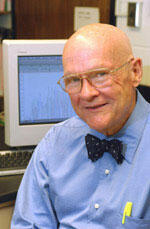Dec. 6, 2002
Retired human genetics chair: A remarkable career
Share this story

"When I woke up on July 1, I felt 20 years younger, so I shaved off my beard," says Walter Nance, M.D., Ph.D., reminiscing recently about the first morning this summer in almost 27 years that he began his day as someone other than the chairman of VCU's Department of Human Genetics.
"Since then, I have enjoyed the luxury of writing or laboring over manuscripts for 4-6 hours at a time in my office. I can't remember when in my career that I've had that luxury!"
Dr. Nance retired on June 30 as chair of human genetics, a role he assumed on Sept. 29, 1975, when he arrived in Richmond from Indianapolis. He had been professor of medical genetics and medicine at Indiana University from 1969-1975 and, before that, assistant professor of medicine and head of the Division Genetics at Vanderbilt University.
On July 1, Peter O'Connell, Ph.D., took the reins as chair. (See O'Connell profile.)
"I've enjoyed the sandbox that VCU gave me to play in," says Nance, who remains a professor of human genetics and continues his internationally renowned research on hereditary deafness. "It's been a great deal of fun, trying to create a department here. We've achieved some degree of success."
In fact, Human Genetics has come a long way at VCU. With the founding of the Department of Biology and Genetics in the School of Pharmacy in 1938 under Dr. Roscoe D. Hughes, what was then known as the Medical College of Virginia became one of the first health care campuses in the country to have a department with "genetics" in its title. In 1969, when VCU was formed, the department was transferred into the new School of Basic Health Sciences as a program in human genetics. It regained full departmental status in 1975, simultaneous with Nance's arrival as chair, and became one of a small handful of autonomous departments of human genetics in the country and the only one of its type in the Southeast at the time.
In a keepsake book prepared for Nance's retirement party in June by his daughter, Martha Nance, a neurogeneticist in Minneapolis who specializes in treatment of patients with Huntington's Disease, colleagues and former students talked about Nance's contributions at VCU:
* Dr. Joann N. Bodurtha, associate professor of human genetics who has managed the department's clinical services since the mid 1980s, described Nance as "the consummate one-on-one teacher."
* Cynthia Morton, Ph.D., who completed the doctoral program in 1982, describes her experience as that of "a family that celebrated wins and losses together and still does so today, although we are widely geographically dispersed. Dr. Nance ruled this family with his brilliance, his ever-inquisitive mind and with his total love of science, medicine and human genetics."
* Robin Winter, Ph.D., who was a postdoctoral fellow from 1976-1978 and now is editor of the London Dysmorphology Database, recalls "the freedom to find out what my interests in genetics might be in a very stimulating and eclectic environment."
* Dr. Barry Wolf, a biochemical geneticist and pediatrician and an early faculty-member recruit, says Nance served as the "father of the department," who "nurtured us, stayed up nights with us, snored with us, praised us, scolded us (gently) and drove with us to small towns in western Virginia."
* Former student Fred Bieber, Ph.D., now a renowned teratologist and forensic geneticist at Harvard Medical School, wrote: "Walter Nance is a remarkably talented academic physician - a leader in the development of the now-mature field of medical genetics. His contributions to the study of inherited variation have been legion. ... Quiet, calm, brilliant, determined, enthusiastic, modest - these terms barely describe Walter Nance, thesis advisor, mentor and friend I so greatly respect and admire."
Nance earned a B.S. in mathematics from the University of the South in Sewanee, TN, in 1954 and an M.D. from Harvard Medical School in 1958. He planned to work as a general medical practitioner after completing his residency at Vanderbilt, but an externship with a family friend and physician led him down a different path when he became fascinated with the variations in placenta types among several twin births he witnessed. The observations led to his first manuscript, "Twins: An introduction to gemellology," published in 1959.
After his residency, he moved to the University of Wisconsin in Madison to study the genetics of haptoglobin, which is a protein that is secreted into the blood by the liver. In the succeeding years, he wrote a series of papers on the genetics of blood proteins, work that culminated in the completion and successful defense of his Ph.D. thesis in 1968. During the past 30 years, he has published 200 works.
By the late 1990s, Nance began to concentrate his research on the genetic causes of deafness. He travels regularly to Mongolia, where he collaborates with geneticists in Ulan Bataar to study the genetic epidemiology of deafness in Mongolia.
Subscribe to VCU News
Subscribe to VCU News at newsletter.vcu.edu and receive a selection of stories, videos, photos, news clips and event listings in your inbox.







